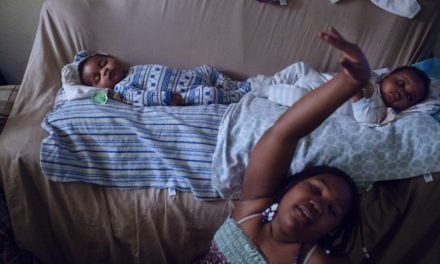
Allowing your children’s father to engage in their lives is a gift that keeps giving. (Photo: ThinkStock)
As Father’s Day approaches, so many of us are dealing with the fact that we will not spend one second of this very important day with our dads. There are many reasons why, but none of them really matter to a child growing up without a father. All of us want him to show up, keep his word and be who we have imagined him to be.
Unfortunately, the fantasy of the perfect Father’s Day will not take place this year for more than 2 million children in the United States alone, but it does not have to be that way. Relationships between fathers, mothers and their children are often complicated, but that does not negate a father’s responsibility to be present or change his children’s need to have him in their lives.
However, this letter is specifically for my sisters who are raising their children alone, but do not have to do it all by themselves. I am reaching out to women who choose to be single mothers, even when their child’s father is fighting for time with his children.
No matter what your path, I understand that your child’s father may have broken your heart when he left, showed no real interest in a committed relationship, chosen another woman over you and the child you were carrying, looked you in the eye and lied, promised child support but gave nothing, or worse — said and did nothing as you managed a baby on your own. In my work counseling families through my organization The Fatherless Generation Foundation, I talk to sisters who have endured all kinds of disappointment. I know that so many of us been through all kinds of pain.
Yet, this Father’s Day, if the father of your children desires to spend time with them, please do not deny him this right. I will not list the endless negative effects of growing up fatherless — as I did. I will simply say, there are consequences to keeping a man who may be a good father away from his children. Let me clarify: I am not talking about a potentially abusive father, nor am I talking about the father who has issues with addiction. Sad as it may be, there are certainly some circumstances in which children should be protected and kept away from their dads. But, there is one thing I see all too often in my work that should never keep a father and child apart — a bitter mother!
Recent surveys report that 50 percent of mothers see no value in a father’s continued contact with his children; 40 percent of mothers report that they have interfered with the father’s visitation rights to punish an ex-spouse. Non-compliance with court-ordered visitation by custodial mothers prevents 77 percent of non-custodial fathers from being able to see their children.
If your children will not see their dad this Father’s Day or any other, is it possible that bitterness or retaliation is the reason? If so, you may be hurting your children as much — or more — than the former man in your life, though that may not be your intent.
Many children of single mothers grow up healthy and strong, but many recent studies have also shown that children with involved fathers do better in school, have fewer emotional and behavioral problems, are less likely to commit a crime, and are less likely to live in poverty. In addition, teenage girls who know their dads are less likely to become pregnant at far too young an age.
If you are unsure if bitterness is keeping your children and their dad apart, let me help you find the answer. Bitterness comes from extreme enmity, nursing a grudge or downright hatred. It may also grow out of a keen sorrow or emotional pain.
My sister, are you denying your children’s father access to them as payback for the things he has done to you? For the sake of our society, our families, and most of all, your children, I will wear my heart on my sleeve to help you understand the importance of allowing your children’s father to engage in their lives.
The Value of a Father’s Love

“Meeting the other part of me changed my life forever,” says the Rev. Dr. Torri J. Evans-Bart, who met her father at the age of 31.
A few weeks ago, while being interviewed on a radio show in Atlanta, a caller told me she thought I was bitter because of my father’s absence from my childhood. As I listened to her perspective, I could not figure out how she reached her verdict. For the rest of the week, I asked myself a very important question, but not the one you think. I was clear that I was not bitter toward my mother or father.
Like 72 percent of African-American children, I was raised in a single parent home and I watched my mother do everything in her power to ensure my safety, as well as my success, while working to provide for my brother and me. I also, like millions of little girls, faced molestation at just 12 years old — an attempt to steal my womanhood before it even began. I have every right to be bitter. However, something bigger than myself was keeping bitterness at bay.
As a child, I don’t remember asking too many questions about my father, but as a young adult I continuously asked myself why he wasn’t present to protect me. At the age of 31, I was finally blessed to meet my father. Meeting the other part of me changed my life forever. His unconditional love brought all of the questions about who I really was together for me like a beautiful, perfect melody.
So you see, in seeking their father, your children are looking for the other half of themselves. They want, and need, to know the origin of all of the traits — whether it’s just the way they walk, turn a certain phrase, or something about their temperament or talents — that may come from the other side of their family.
They are looking for their full identity and if they cannot access it from a relationship with their father they will find it in other places — mostly negative, self-destructive places. This dysfunctional behavior may not appear in their adolescence. You may not see the displaced anger, the drive to commit suicide, the intent to drop out of high school, or engage in substance abuse, to name a few of the effects of absent fathers. But be clear, the negative effects will come.
As I delve into my personal life, I realize I am not bitter because God showed me His purpose through my fatherless journey. He showed me how my parent’s decisions could have destroyed me, but it was His plan to turn what was intended to be a negative cycle into a blessing not only impacting my life but the lives of millions.
In 2010, I launched The Fatherless Generation Foundation. We reunite children with their biological fathers, while providing the resources and services that strengthen, support and elevate the commitment to fatherhood and family values. We have worked with approximately 20,000 fatherless children through our peer groups, reunited 176 fatherless children with their fathers and mentored 259 children through our Husband & Wife Mentor program.
So my sisters, I offer you another way to look at the bitterness you may feel — do not allow it to remain a part of your life. Rest assured that whatever pain you have endured, God intends to turn it around for the betterment of you and your children. This Father’s Day give your children, and their dad, another chance.
The Rev. Dr. Torri J. Evans-Barton is CEO and founder of The Fatherless Generation Foundation in Atlanta. She is an expert on fathers and families who appears on the Ricky Smiley Morning Show.








